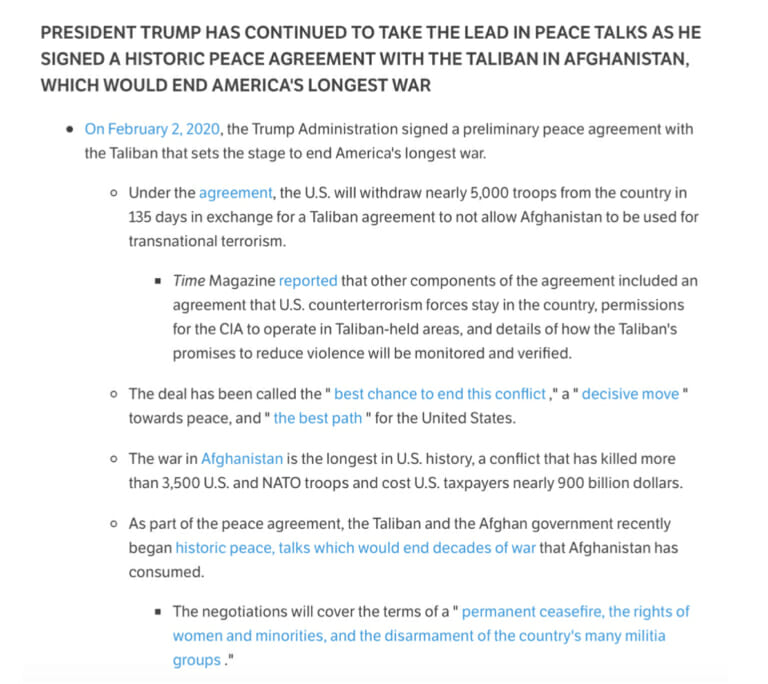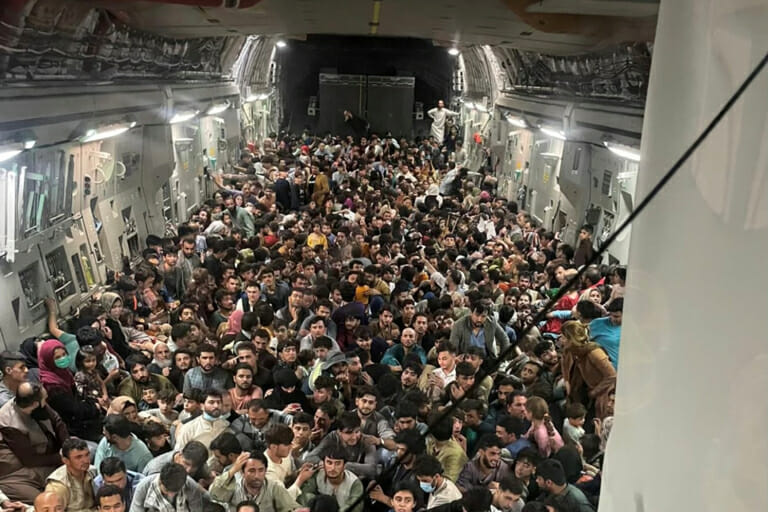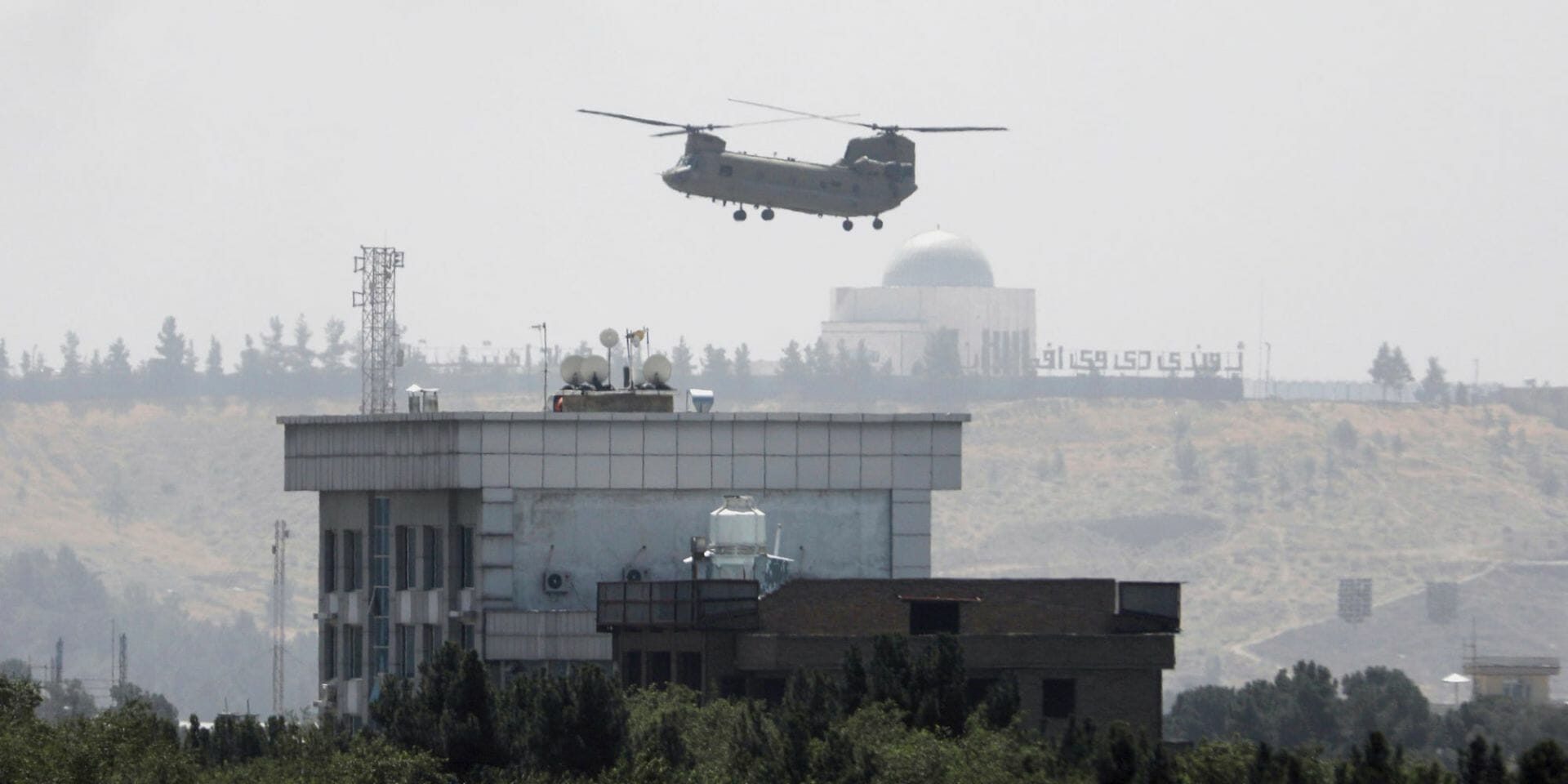On August 17, as the Taliban consolidated their control of Kabul, thousands of Afghans climbed the razor-topped perimeter of Hamid Karzai International Airport, clinging onto planes, some falling from the sky.
Images of desperation have surfaced that may be lasting testaments of the failure of the U.S. led campaign in Afghanistan.
Among them are those of U.S. military helicopters evacuating personnel from the roof of the U.S. embassy. Biden’s enemies have wasted no time in comparing the scramble to evacuate American personnel from Kabul to the fall of Saigon in 1975.
This is Joe Biden’s Saigon.
A disastrous failure on the international stage that will never be forgotten – meanwhile Joe is on vacation. https://t.co/qe17HhEPm9
— Elise Stefanik (@EliseStefanik) August 15, 2021
The comparison to one of the most embarrassing episodes in American foreign policy is explosive, and may not come out in the wash for Biden’s presidency. A cosmetic similarity is allowing the weight of the travesty and trauma of the Vietnam war to color Biden and his administration in the public eye.
Earlier this year Biden said, in a quote that will plague the rest of his career: “There’s going to be no circumstance where you’ll see people being lifted off the roof of an embassy of the United States from Afghanistan.”
PHOTO 1: US diplomat evacuate US from embassy via helicopter as the #Taliban enter #Kabul from all sides. #Afghanistan (2021)
PHOTO 2: US diplomat evacuate US from embassy via helicopter as the PAVN & Viet Cong capture of Saigon, Vietnam (1975) pic.twitter.com/YamWmzjOay
— Stefan Simanowitz (@StefSimanowitz) August 15, 2021
Despite loud and growing opposition to the continued U.S. withdrawal, Biden remains defiant, saying on Tuesday that he “stands squarely behind” the U.S. withdrawal. He repeated the fact that Washington has spent $1 trillion in Afghanistan and continues to support the Afghan National Army.
Mitch McConnell, the most senior Republican in Congress, has urged further support to Afghan forces, saying “Without it, al-Qaida and the Taliban may celebrate the 20th anniversary of the September 11 attacks by burning down our embassy in Kabul.”
McConnell invoking the memory of 9/11 is a disaster for Biden, the president who has marketed himself to his electorate as a veteran-loving patriot and a staunch defender of traditional American values.
He is now being accused of betraying those who died in 9/11, the terror attack by al-Qaeda that provoked the invasion of Afghanistan in 2001.
Related Articles: Taliban Take Kabul: “War is over in Afghanistan” | Taliban Ascendency Intensifies: “It’s Their Struggle” Says Pentagon
This rush to flee will provide a suitably meek comparison to Republican narratives of what Donald Trump, with his brash approach to foreign policy, would have done had he been in office.
But the blame for what we are currently seeing in Afghanistan cannot be wholly assigned to Joe Biden. It was Trump who made the agreement and signed the documents guaranteeing the withdrawal of American troops from Afghan soil.
And it turns out, this agreement was nothing short of farcical. Amounting to a total surrender to the Talibans. Signed last year, on Feb 29 2020, between the Trump administration and the Taliban forces, the “Agreement for Bringing Peace to Afghanistan” put aside the official government of Afghanistan – dropping an ally.
While the agreement made sure to protect U.S. interests, it provided no guarantees for the Afghan government, merely stating that “a permanent and comprehensive ceasefire will be an item on the agenda of the intra-Afghan dialogue and negotiations.”
Read it for yourself. To me, this deal seems wilfully naive. I find it hard to believe that a complete Taliban takeover wasn’t on the cards from the beginning.
Details of the agreement have since been taken down from Republican websites:

Kabul and Saigon: a fair comparison?
So, even if this isn’t “Biden’s Saigon,” is the comparison useful or even fair?
Both wars were extremely costly to America, lasted about 20 years, and had a very divisive impact on the American people.
Both also ended in a sudden, much-faster-than-expected advance of the opposing side. On March 5, 1975, the C.I.A. published a memo estimating that South Vietnam would hold out until at least the beginning of 1976. Less than two months later American diplomats were rushing onto the roofs of Saigon.
Similarly, US Military Intelligence from just last week drastically underestimated the time it would take the Taliban to regain control of Afghanistan, suggesting that Kabul would be under pressure in September, and fall a couple of months later. It fell on Sunday.
Analysts, US lawmakers and people around the world have been comparing the so-called fall of Saigon with the Taliban takeover of Kabul, but how does it compare?https://t.co/OyrqFDWhDy pic.twitter.com/ZU0poHK7wa
— BBC World Service (@bbcworldservice) August 17, 2021
In both cases American interventionism failed spectacularly: the goal of establishing an autonomous, democratic state in Afghanistan and Vietnam was not achieved. One of the world’s most powerful, self-righteous nations was pictured for all time in an undignified sprawl onto emergency aircraft, having failed, despite its predictions, to mould the world in its image.
After the heady days of the American success in WW2, the Saigon debacle loomed as a big question mark on the American narrative of their own superiority, moral and military. Americans viewed themselves as the principal agents of the inevitable progress of liberal values and democracy, endowed with the know-how, can-do attitude, and elbow grease required to bring the world around and end history.
This self-fashioned identity is at the core of the public side of American foreign policy. Both Saigon in 1975 and Kabul in 2021 are more than just chinks in this armour.

In reality the wars in Afghanistan and Vietnam were very different.
The loss of American lives is strikingly different in magnitude: 232,000 American soldiers died in Vietnam, compared to 2,442 in Afghanistan. The two wars happened in different times, different geopolitical contexts, between different nations and ideologies.
But this will not really matter. Although the comparison between the falls of Saigon and Kabul are at best symbolic, this symbol is what will matter in the end.
This blow to America’s ego is happening for all to see. Twenty years of wasted lives. $1 trillion spent. But this is not all Biden’s fault. This is not ‘his’ Saigon, it’s America’s.
Editor’s Note: The opinions expressed here by Impakter.com columnists are their own, not those of Impakter.com. — In the Featured Photo: A helicopter above the US embassy in Kabul. Featured Photo Credit: AP Photo/Rahmat Gul









